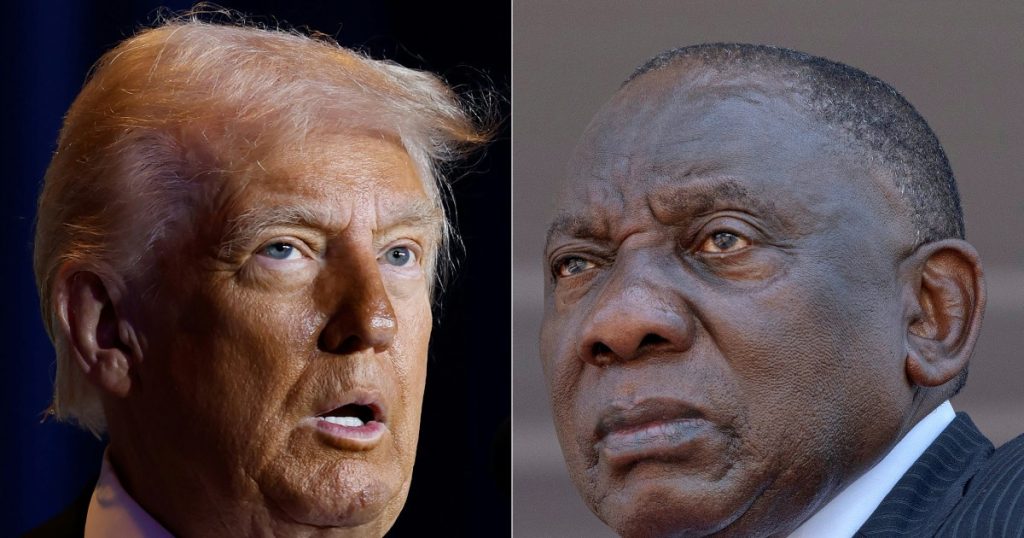Summarize this content to 2000 words in 6 paragraphs United States President Donald Trump has frozen aid to South Africa in an escalation of a rift between his administration and Pretoria over a controversial land expropriation law aimed at tackling inequality stemming from apartheid.
In an executive order signed on Friday, Trump said the law showed a “shocking disregard” for citizens’ rights and would allow the government to seize land from ethnic minority Afrikaners without compensation.
The passage of the Expropriation Act, signed last month by South African President Cyril Ramaphosa, followed “countless” policies designed to dismantle equal opportunity, as well as “hateful rhetoric” and government actions that have driven violence against “racially disfavored” landowners, Trump said in his order.
South Africa has also taken “aggressive positions” towards the US and its allies, including accusing Israel of genocide at the International Court of Justice (ICJ) and boosting relations with Iran, Trump said in the order.
“The United States cannot support the government of South Africa’s commission of rights violations in its country or its undermining United States foreign policy, which poses national security threats to our Nation, our allies, our African partners, and our interests,” the US president said in the order.
Trump’s order also said his administration would promote the resettlement of Afrikaners “escaping government-sponsored race-based discrimination”.
Trump and Ramaphosa have been engaged in an escalating war of words over the law since Sunday, when the US president accused his counterpart’s administration of “confiscating land” and mistreating “certain classes of people”.
On Wednesday, US Secretary of State Marco Rubio said he would skip the upcoming Group of 20 (G20) talks in Johannesburg in response to the legislation and other “very bad things” happening in the country.
Ramaphosa has insisted the law is not a “confiscation instrument” but part of a “constitutionally mandated legal process”, and argued that it will ensure public access to land in an “equitable and just manner”.
In an address to parliament on Thursday that appeared to take aim at Trump, Ramaphosa said that his country would stand united amid a rise in the “pursuit of narrow interests” and “the decline of common cause”.
“We will not be deterred. We are a resilient people. We will not be bullied,” he said.
Under the expropriation law, the government may seize land without compensation where it is deemed to be “just and equitable and in the public interest”, such as in cases where it is not being used, and after efforts to reach an agreement with the owner have failed.
Ramaphosa and his African National Congress have said the legislation is necessary to alleviate huge disparities in land ownership stemming from colonial settlement and the subsequent institution of racial segregation and white-minority rule.
The government has yet to expropriate any land under the law.
The Democratic Alliance (DA), South Africa’s largest opposition party and a member of the ANC-led national unity government, has strongly criticised the law, casting it as a threat to property rights and much-needed foreign investment.
The DA, which draws most of its support from white, Indian and multiracial South Africans, has also expressed concern about Trump’s threats and denied suggestions that the law allows land to be seized “arbitrarily”.
Land ownership is a heated issue in South Africa due to the legacy of apartheid, which lasted from 1948 until 1994.
Although Black South Africans make up more than 80 percent of the population, they own just 4 percent of privately owned farmland, according to a government audit conducted in 2017.
White South Africans, who make up about 7 percent of the population and are divided between Afrikaans-speaking descendants of Dutch settlers and English-speaking descendants of British colonialists, hold about three-quarters of the land.
Trump’s campaign against South Africa comes as his administration is clamping down on foreign assistance more broadly, including by effectively dismantling the US Agency for International Development (USAID).
Washington allocated about $440m in assistance to South Africa in 2023, according to the most recent US government data.


